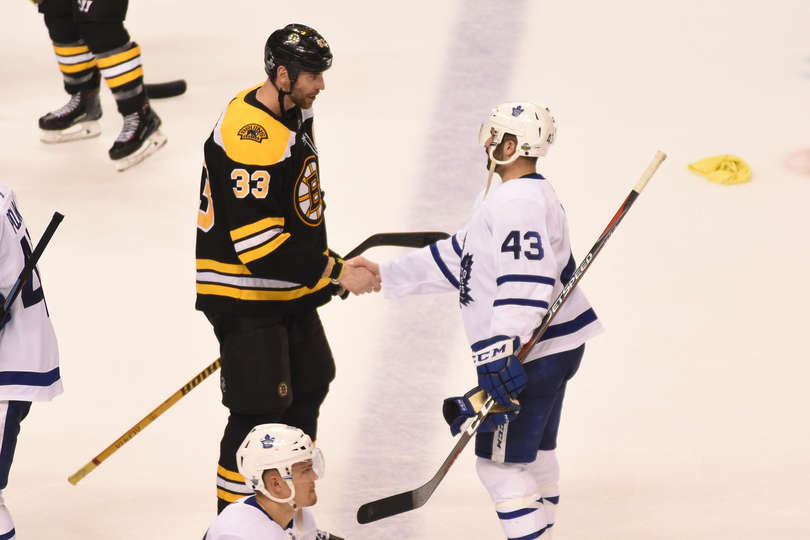A 3-1 series comeback ended in Game 7 third-period disappointment in Boston for the Toronto Maple Leafs, who will have to wait at least another year to win their first playoff round since 2004.
Your final game in ten for the 2017-18 season:
1. First of all, it should be recognized that while this is a first-round exit on paper, it wasn’t your typical Round 1 out. Sitting tied for sixth overall in the league, the divisional format meant that the Leafs played the fourth-best team in the NHL (and second best since January 1st) right out of the gates. It was the toughest/closest matchup there was in Round 1 this postseason, and fittingly, seven games were necessary to decide it. The Leafs exit the postseason as the best team to be eliminated in the first round – both as far as their regular-season finish in the league standings, and by how far they went in the series (seven games).
As Babcock put it after the game, entering into a Game 7 third period against the Bruins in possession of the lead was about as good as one could have realistically hoped for entering the series. That would’ve especially been the case if you told Leafs fans Nazem Kadri would be out for three of those games. The Leafs didn’t deserve to win the series, in fairness, but they nearly did and easily could have. Given their position after 40 minutes in Game 7, they really should have.
2. Let’s start with a few positives: Mitch Marner took a major step forward in the second half of the 2017-18 regular season and carried it on through the entirety of this seven-game battle. He was driving the power play as well as his line at 5v5, and he made plays at key moments all series, including Game 7. While the Leafs‘ other young offensive stars struggled to make an impact consistently in this series, Boston didn’t have a real answer for Marner at any point. Not only did he perform and produce against a great team at playoff time, he also wasn’t slotted in a sheltered role as he was last year – he was doing all of this on a matchup line next to either Kadri and Marleau or, in a few playoff games, Plekanec and Marleau.
The end of 2017 brought its challenges for Marner, starting with contracting mono prior to the 2017 playoffs. But he found his way over the hump, overcame his first real adversity as a pro, and took a major stride forward in his development. A true impact player now and a rising star in the league, he’s a player other teams have to build a game plan for. When it comes to wingers who drive their lines and can play in a matchup role responsibly like Marner just did at his age (20), he’s in rarefied air, to say the least — and he’s only getting better.
3. Further cemented in this series, Kasperi Kapanen established himself as a full-time NHLer and capable top nine winger in this league (and an ace up the sleeve on the penalty kill). He can and should take on more responsibility right away next season. His shorthanded goal in Game 7 was maybe the best Leaf goal of the year and it showed again that he has the ability to rise to the occasion at key moments in big games. A player with his game-breaking speed is a weapon many teams would kill for; he’s also a pretty fearless competitor, he’s a hungry puck hunter on the forecheck, and he’s developed his body to the point where he’s strong on the puck by NHL standards. While it’s possible he’ll always be a player that leaves you wishing he’d bury more of the chances his speed creates, the goal in Game 7 couldn’t have been better taken and he could’ve easily buried a bunch more in this series (he hit three posts).
4. The question about Andreas Johnsson‘s NHL upside did not pertain to his skill, his smarts, or his competitiveness – it was whether he had the top gear he needed to be effective in the NHL. He answered that question late in the season and into the playoffs. While the physicality of the series sometimes appeared to be a learning experience for him, he’s an NHL piece for this team moving forward. There was an injury at play, but he more or less took a quality veteran in Leo Komarov’s job in elimination playoff games. The word on Johnsson coming over from Sweden was that he’s a coach’s dream, and impressively, he earned Babcock’s trust in very short order. For the Marlies watching in the system, Johnsson is a great role model as a former seventh round pick who worked his tail off and kicked the door down when he got his opportunity.
5. At the team level, the Leafs mixed quality veterans into key roles this year between Patrick Marleau and Ron Hainsey and later Tomas Plekanec, but obviously, the team’s best players are still all 23 and under. They were up against veteran leaders who had Olympic gold medals and Stanley Cups to their names in Bergeron, Marchand, Chara, Krejci and co. It’s really not fair to make anyone on this team outside of Jake Gardiner, Tyler Bozak, Nazem Kadri and James van Riemsdyk – none of whom played that well in Game 7 — wear the 2013 collapse as some sort of prologue to what happened here tonight. Matthews and Nylander are going to be upset with themselves about their performance in this series, and they should be. When the shock wears off, though, it needs to be the fuel that drives them to be better, with the awareness now of what it’s going to take to outcompete the game’s elite like Bergeron and Marchand over a seven-game series like this.
Pretty notable was the contrast in how the Leafs’ best players went about playing with the lead when they had it in this this series versus how that Bergeron line went about it in the third period of Game 7 — they dumped a puck in deep, got after it, won battles on the forecheck, and added to the lead for the 6-4 Pastrnak goal.
6. Now, on to the negatives.
Let’s start here: It doesn’t take a genius to point out that the Leafs defense could not transition the puck well enough against the Bruins forecheck, and that the team over-relied on the stretch pass, flip out, or high-of-the-glass play to get out of its own end. Jake Gardiner was perhaps the perfect microcosm of the stretch-pass reliance, living and dying by it in this series and in this Game 7, in particular. The flip out/high off the glass play became the go-to for Ron Hainsey and Nikita Zaitsev at the first sign of trouble. There is a personnel element and a systems element at play here. Both of the latter are slotted too high on the current depth chart and were tasked with too many minutes this season and playoff.
At the other end, the Leafs’ dump-ins were giveaways too frequently – too often, the Bruins would retrieve, go D-to-D, and off they went, tilting the ice back in their favour. You can rue the bad luck of hitting the ref in the skate off a clean faceoff win prior to the tying 4-4 goal, or the bounce off the end boards for the Patrice Bergeron goal, but at the end of the day, all you can do is set yourself up with the best possible odds and try to make your own breaks. The Leafs did not do that in this series due to their failure to tilt the ice enough in their favour.
7. The Leafs’ control over play in score close situations was second worst to only Minnesota among playoff teams – they were at 44.7% Corsi For percentage, a 42.6% Shots For percentage, and a 47% Scoring Chances For percentage when the score was within one over the seven-game series. If you organize playoff teams by score-close CF%, the bottom eight are now eliminated and the top eight are moving on to Round 2.
8. The offensive zone time issue – also known as the lack of cycle game, or one-and-done offense problem — is one the Leafs are going to have sort out this summer. It’s not a question of talent; it’s a roster makeup and systems issue. There is the issue of needing to be heavier and also the issue of puck support; it was evident how far apart the Leafs played at times compared to the way the Bruins support on the forecheck and cycle. The Leafs had similar problems after the 2013 loss to Boston and went about their off-season fixes totally wrong. The Leafs will need to address the issue without being too reactionary about it through recklessly shedding skill and speed for brawn.
9. In the defensive zone without the puck, the Leafs remain a serious work in progress. The Bruins outshot the Leafs 245-197 in this series; of that total, the Bruins defensemen outshot the Leafs’ defensemen 77-53 (the Bruins defense generated 45% more shots than the Leafs’ did). The Leafs failure to break the Bruins cycle, cover off the points, and — particularly early in the series — their struggles to box out effectively in front of their net put them behind the eight ball in this series from the very beginning. When the goaltending slipped in Games 1, 2, 4 and then 7, the Leafs couldn’t keep it out of their net. With their leakiness defensively, we knew the Leafs would need excellent goaltending and they got average to below-average netminding, looking back at the series as a whole.
10. There will be much more to sort through in the days and weeks to come as far as the individual and team performances in this series, what it means for the offseason, and much more. For now, I’ll leave you with this Babcock quote from the end of the regular season:
“Pain… normally what happens with a young team is, you get into the playoffs, and then you start thinking you might be one of the favourites… You end up having some playoff failures and everyone is telling you how bad you are, and then you fight through that and find a way.
This winning the ultimate prize is not an easy thing. As much as we are now a team in the league that looks like a good hockey club, you’ve got to do it year after year after year, and you’ve got to be a team that can win at playoff time. Lots of times, the teams that win in the regular season aren’t the teams that win at playoff time. There is only one team that gets to win. It’s a grind. I’m prepared for that totally. It’s not going to be easy.”




































